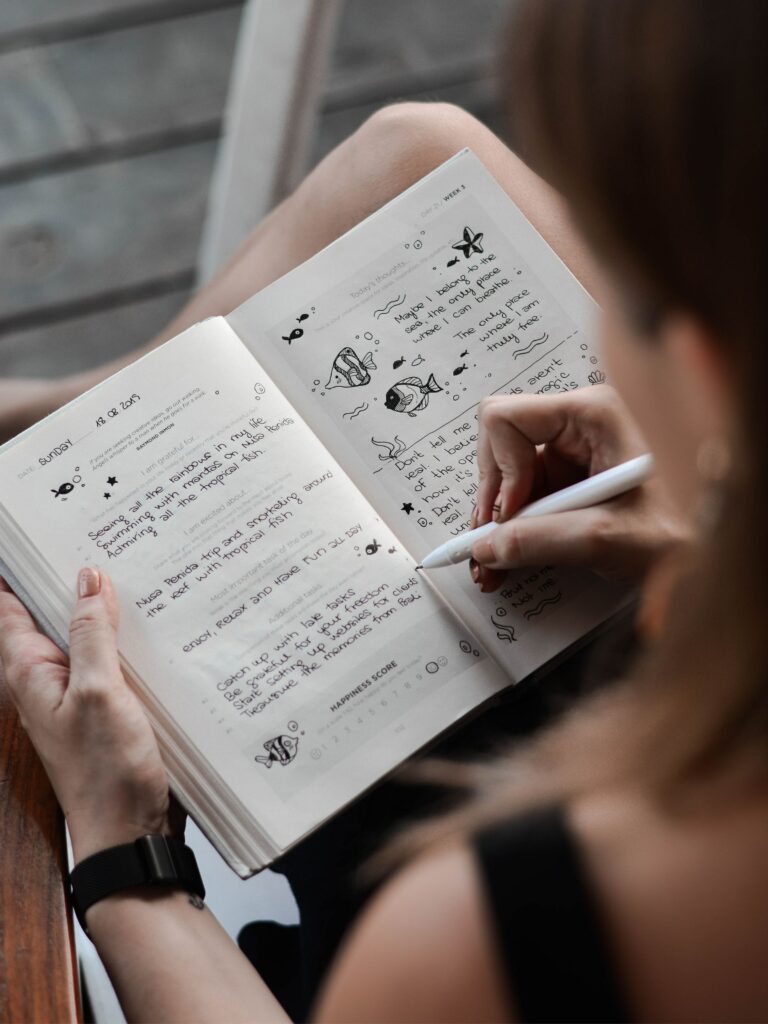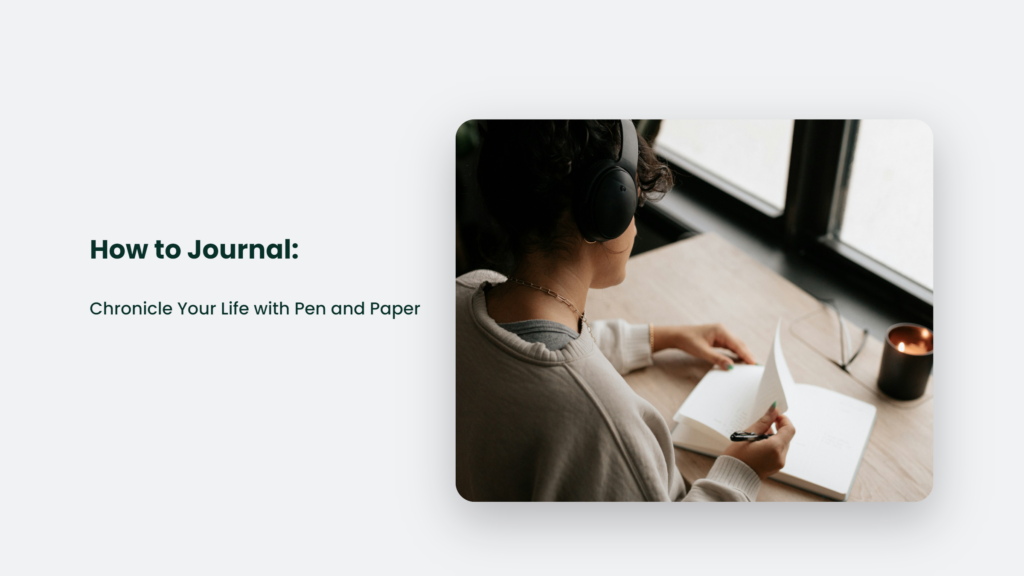

How to Journal: Chronicle Your Life with Pen and Paper

As Seen On
Journaling. It sounds simple enough – just grab a notebook and pen and start pouring your innermost thoughts onto paper, right?
Well, not quite.
Journaling is an art. A skill. A habit that takes practice to master.
Done right, keeping a journal can be profoundly rewarding. It can help you make sense of life’s chaos, better understand yourself, and even boost your creativity.
But do it haphazardly, and you might find the exercise pointless. Or worse, depressing.
So, how do you journal the “right” way? Let’s dig in.

Why Journaling Matters
Before we get into the nitty-gritty of how to journal, it helps to understand why it matters in the first place.
Here are just a few of the incredible benefits you can reap from keeping a journal:
It Reduces Stress
Life gets hectic sometimes. Our to-do lists pile up, work overwhelms us, and our brains turn to mush.
Journaling provides an outlet for all that pent-up stress. It lets you dump all your worries and anxieties onto the page, clearing your mind.
One study even found that journaling for 15 minutes daily helped reduce symptoms in people with asthma and rheumatoid arthritis – two stress-sensitive conditions.
It Boosts Immunity
Stress relief doesn’t just make you feel better – it makes your body healthier, too.
Research shows that expressive writing – like the kind you do in a journal – enhances immune function. It increases T-cell activity that protects the body from illness and infection.
So, if you’re prone to getting sick, keeping a journal might boost your defences.
It Improves Memory
As we age, our memories tend to get fuzzier. Once etched in our minds, names, dates, and details start slipping away.
Journaling may help sharpen those memories and preserve important information.
One study found participants had significantly better recall of autobiographical memories after journaling than those who did not.
So, if you want to hold onto precious life moments – get writing!
It Helps You Sleep
Do you toss and turn at night, your mind racing through the day’s events? Journaling before bed can help you unwind and empty your mind so you fall asleep faster.
One study asked participants to write about emotional topics for 20 minutes per day over four nights. Those who journaled fell asleep faster and slept longer compared to non-journalers.
So, if you struggle with insomnia, try picking up a pen instead of counting sheep!
It Sparks Creativity
Stuck in a creative rut? Try free-writing in a journal.
Letting your thoughts and ideas flow freely on paper is like fertilizer for your imagination. It cultivates fresh insights and new connections you may never have made otherwise.
Journaling creates a space to plant the seeds of creative genius. You never know what might bloom.
Of course, keeping a journal has dozens more benefits – far too many to list here. But hopefully, you now see why it’s so much more than just “writing your thoughts down.”
It’s a powerful tool for self-discovery, problem-solving, and crafting the life you want.
Now, let’s get into the details of how to journal for maximum impact.
How to Journal: 10 Tips to Write with Meaning
Journaling is simple in concept but nuanced in practice. Follow these 10 tips to make your journaling habit stick:
Set a Consistent Time and Place
Treat journaling like an important meeting – block off time for it in your calendar and make it non-negotiable.
Pick a time when you can expect to be alone and free from distractions. Many people journal first thing in the morning or right before bed. Find what works best for your schedule.
Having a designated journaling spot also helps – it gets you into the right headspace. Make it somewhere comfortable where you can relax and reflect.
Date Each Entry
Dating your journal entries makes looking back and contextualizing what you wrote easier.
You’ll be able to identify patterns, track progress, and see how your perspective changes over time.
Plus, looking back on entries from years past can be incredibly nostalgic!
Write Longhand
While typing may be faster, writing longhand has unique benefits. The act of handwriting engages your brain in a different (deeper) way.
In one study, students who took notes by hand had better conceptual understanding and were more successful on tests than laptop note-takers.
So, put down the laptop and pick up a nice pen. But if you prefer to type, that works, too – do what feels most comfortable.
Forget Perfection
This is the hardest one for many. We’re tempted to polish our journal entries like pieces of fine literature.
But journaling isn’t about crafting flawless prose but honest self-reflection. Permit yourself to write imperfectly.
Resist the urge to edit as you write. Let your thoughts flow raw and uncensored. That’s where the magic happens.
Reflect on Key Moments
Use your journal to make sense of noteworthy occasions, relationships, or feelings.
For example, you might reflect on:
- A conflict you had with your partner
- How you felt at an important event
- A mood you can’t seem to shake
Reflecting helps you process experiences while they’re fresh to gain insight.
Explore Your Inner World
Your journal is the perfect place to dive deep into your inner experience. Explore your:
- Hopes, dreams and ambitions
- Fears, doubts and insecurities
- Values, beliefs and desires
- Quirks, habits and idiosyncrasies
Observing your inner world often reveals truths about yourself that get buried under the busyness of daily life.
Find Gratitude
When life feels heavy, your journal is a place to find light. Use it to notice and appreciate the good around you.
You could list 3 to 5 things you’re grateful for or reflect on recent positive experiences.
Focusing on gratitude rewires your brain to see the bright side – try it for an instant mood boost!
Unplug and Be Present
For a set time while you journal, unplug completely. No phone, email, TV, or internet.
Remove all distractions so you can be fully present with yourself, your thoughts, and your pen.
This “digital detox” lets you dive deep into reflection and gain clarity untainted by outside influences. Try it – it’s liberating!
Let It Flow
Don’t overthink or force your journaling. Especially at first, write what comes naturally.
Follow your train of thought wherever it leads. Don’t worry about structure or cohesion.
The more you journal, the easier active reflection will come. For now, give your mind the freedom to wander and explore.
Stick With It!
Like any habit, regular journaling takes time to stick. But the effort pays off exponentially.
On days you don’t feel like writing, do it anyway. Push through blocks and distractions.
Over time, journaling will become second nature. And you’ll reap the incredible benefits discussed earlier.
Journaling is simple but not easy. But I promise with regular practice, you’ll learn to love it.
Now, you’re ready to start writing in a meaningful way! Refer back to these tips whenever you need guidance or inspiration.
Frequently Asked Questions:
How long should each journaling session be?
Aim for 15-30 minutes. But write for as long (or as little) as you want.
Should I journal every day?
Ideally, yes – but start with whatever feels sustainable. Even 2-3 times per week can be beneficial.
What if someone reads my journal?
Ask them to respect your privacy. Or keep your journal somewhere safe, like a locked drawer.
Start Writing Your Story
There you have it – a complete guide to journaling with intention.
Now, it’s time to implement these tips and start writing your story. Not somebody else’s – yours.The beautiful, messy, unpredictable story that only you can tell.
Journaling allows you to be the author of your own life. To define what this grand adventure called life is all about.
So what are you waiting for? Grab your journal, set a timer for 15 minutes, and start writing.
The blank pages are waiting.
Konger
Up until working with Casey, we had only had poor to mediocre experiences outsourcing work to agencies. Casey & the team at CJ&CO are the exception to the rule.
Communication was beyond great, his understanding of our vision was phenomenal, and instead of needing babysitting like the other agencies we worked with, he was not only completely dependable but also gave us sound suggestions on how to get better results, at the risk of us not needing him for the initial job we requested (absolute gem).
This has truly been the first time we worked with someone outside of our business that quickly grasped our vision, and that I could completely forget about and would still deliver above expectations.
I honestly can't wait to work in many more projects together!
Disclaimer
*The information this blog provides is for general informational purposes only and is not intended as financial or professional advice. The information may not reflect current developments and may be changed or updated without notice. Any opinions expressed on this blog are the author’s own and do not necessarily reflect the views of the author’s employer or any other organization. You should not act or rely on any information contained in this blog without first seeking the advice of a professional. No representation or warranty, express or implied, is made as to the accuracy or completeness of the information contained in this blog. The author and affiliated parties assume no liability for any errors or omissions.

